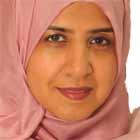Muslim Author Speaks Out On Darfur
Susan notes: An excerpt from an article by Shelina Zahra Janmohamed, British Muslim writer, blogger and author of the recently released book Love in a Headscarf. The full article on Darfur appears today on Janmohamed's blog and in Abu Dhabi daily newsaper The National.
 I went to see Darfur with my own eyes at the end of last year. In the camps outside Al-Geneina, the capital of West Darfur, I saw families living in tents no more than three metres square, with rationed food and water.
I went to see Darfur with my own eyes at the end of last year. In the camps outside Al-Geneina, the capital of West Darfur, I saw families living in tents no more than three metres square, with rationed food and water.
Aid agencies were doing their best, but the Sudanese government is not keen on their presence and, with the crisis into its sixth year, donors are growing weary.
At one school I visited, scores of fidgeting youngsters dressed in white stood under the midday sun facing inwards to a small centre stage where their head teacher led them in vibrant song. Their joillity belied the pain many had endured, especially those old enough to remember the bloodshed, fear and crisis that began in 2003. I spoke to two young girls.
"I'd like to become a lawyer when I'm older," 16-year-old Fatima told me. "I want to be a writer," said her friend Layla. "Why?" I asked. "To make our country better," said Fatima. "So it doesn't happen again," said Layla.
Click here to read the full article
By Shelina Zahra Janmohamed
On her blog Spirit21
Or in The National online
 I went to see Darfur with my own eyes at the end of last year. In the camps outside Al-Geneina, the capital of West Darfur, I saw families living in tents no more than three metres square, with rationed food and water.
I went to see Darfur with my own eyes at the end of last year. In the camps outside Al-Geneina, the capital of West Darfur, I saw families living in tents no more than three metres square, with rationed food and water.Aid agencies were doing their best, but the Sudanese government is not keen on their presence and, with the crisis into its sixth year, donors are growing weary.
At one school I visited, scores of fidgeting youngsters dressed in white stood under the midday sun facing inwards to a small centre stage where their head teacher led them in vibrant song. Their joillity belied the pain many had endured, especially those old enough to remember the bloodshed, fear and crisis that began in 2003. I spoke to two young girls.
"I'd like to become a lawyer when I'm older," 16-year-old Fatima told me. "I want to be a writer," said her friend Layla. "Why?" I asked. "To make our country better," said Fatima. "So it doesn't happen again," said Layla.
Click here to read the full article
By Shelina Zahra Janmohamed
On her blog Spirit21
Or in The National online